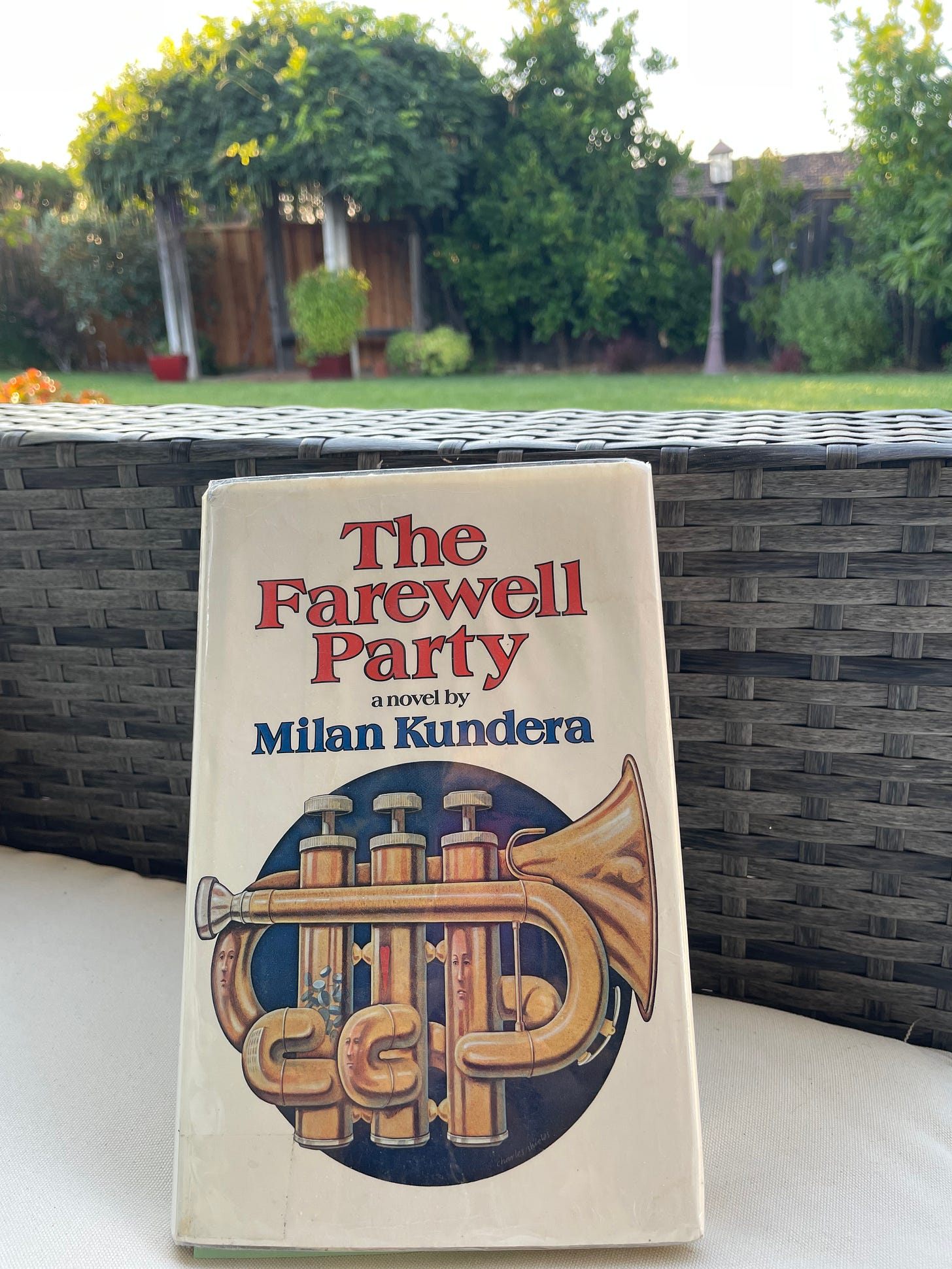READING THE LATE MILAN KUNDERA
When a celebrated Czech writer dies, I realize that my reading days are numbered, too. I rush madly to read one of his earliest books.

Had I had my son’s foresight when I was a teenager, I’d have begun reading with a clear plan early on. Instead, I read Mills&Boon romances—specializing in an author called Janet Dailey—whose potboiler romances were rated highly in action of a certain kind.
Now, at 61, as a result of having squandered my eyesight on such puerile works notwithstanding their excellent grammar, I have never read works by celebrated contemporary writers, including those by the late Milan Kundera. The closest visual equivalent of my brain would be a slab of Emmental cheese: More holes, less cheese.
When the 94-year-old Czech-French novelist passed away last week, yet again, it was an affirmation of my own mortality. I resolved to make my next pick his earliest book. However, the earliest work that I could get at short notice from my library was The Farewell Party, a story about a musician named Klima who receives a call from a one-night stand named Ruzena.
She repeated: “I really must talk to you.”
“What’s the trouble?”
“Something’s happened since I saw you.”
He could hardly speak. After a pause he said softly: “What do you mean?”
“It’s been six weeks now.”
Given that our famous trumpeter, Klima, is a philanderer, reading it in 2023 brought up some attendant questions. Why he wasn’t using protection which was anyway widely available at the time? I recalled that in the early seventies, the world had just emerged from a youth movement that began in the United States and spread to different countries around the world. Hippies then advocated nonviolence—and love, of course. “Make love, not war” was the mantra of the day.”

By the end of the sixties, a movement had been launched called the Prague Spring, a period of mass protest in the Czechoslovak Socialist Republic. The movement towards political liberalization began with the election, in January 1968, of Alexander Dubček as First Secretary of the Communist Party of Czechoslovakia (KSČ), and continued until August 1968, when the Soviet Union and most Warsaw Pact members invaded the country to suppress the reforms.
At this time, right when the Soviet Union crushed the Prague Spring, Milan Kundera’s first published work, The Joke, (1967), was banned. Kundera clearly continued to incinerate those at the helm of the government. He also wroteThe Farewell Party at a critical time in Czechoslovakia’s history. In 1972, a couple of years before Kundera was forced to leave the country, he published the novel, and its translation into English by the late Peter Kussi was published by Knopf in 1976. The Prague Spring is also featured in Kundera’s later novel, The Unbearable Lightness of Being; it follows the repercussions of increased Soviet presence and the dictatorial police control of the population.
In The Farewell Party, Kundera introduces us to eight characters whose destinies become intertwined in a resort town where childless women come to the spa for treatment. Dr. Skreta is the spa’s doctor who, in the pretext of curing infertility, injects his sperm (from his private sperm bank) into women, with the result there are many little Skretas being…excreted…around town. They all possess the same nose and mouth. This “brotherhood” and community that Dr. Skreta wants to create is the antithesis of the destruction that musician Klima expects from Ruzena simply so that he can remain married to his gorgeous wife Kamila with whom he is very much in love.

Comical and Wodehousian as it is in some parts, the story brings up many issues that confront society even half a century later. The book poses questions about abortion and the propagation of life at a time when external forces threaten a nation’s survival. The irony of the situation is not lost on the reader. While one man is trying to clone himself, another is jumping through hoops to cut the cord and sever ties with his unborn child.
In the guise of a character called Jakub, this book makes observations—about the behavior of human beings—that I found both thought-provoking and distasteful. Jakub is unhappy in his country and intends to flee his hometown to find happiness elsewhere. He makes several black and white pronouncements about his fellow humans.
“There isn’t a person on this planet who is not capable of sending a fellow human being to death without any great pangs of conscience. At least I have never found anyone like that.”
Jakub’s theory on suicide is stranger still. He has been holding on to a suicide pill because in his country one never knew when the need might arise. His rancor is not contained to just his nation, however.
“I believe that every person should be given a poison tablet on the day he or she reaches maturity. A solemn ceremony should accompany this presentation. Not in order to lure people to suicide. On the contrary, to let them live in greater peace and security. To let everybody live with the certainty that they are lords and masters of their own life and death.”
Kundera poses many questions about propagating mankind and Jakub’s view on the “cult” of fertility, exasperating as it is to read, is not entirely without reason in a world increasingly unable to bear its human burden.
“Nurses show a certain contempt toward women undergoing abortions, even though they themselves may have to subject themselves to the same procedure at some point in their lives. But the distaste is far stronger than logic because the cult of fertility is a dictate of nature. That’s why it is idle to look for logic in the propaganda for population growth.”
There’s another brow-raising reason why Jakub does not wish to reproduce. He says that fertility and reproduction are—in today’s parlance—over-rated, and that bringing a child into this world, when the parents are not intelligent or laudable enough, adds little value to the world. Then there’s the message parents send.
“Parenthood implies absolute affirmation of human life. My fathering a child would be like proclaiming to the world: I was born, I tasted of life, and I found it so good that I deem it worthy to be multiplied.”
The plot of The Farewell Party is action-packed, of course, with the forward momentum of the story dictated by the tension between Klima, Kamila, and Ruzena. The narrative constantly pits the miraculous power of creation against the cowardly attempt to snuff out a life. Still, the engaging parallel thread on the topic of creation and controlled procreation—with several tense exchanges in which Jakub and other characters—kept me reading all the way to the end. By the time the story closes, we realize that no matter what happens in the world, natural selection will somehow continue to find a way, even as the likes of Dr. Skreta clone themselves to ensure their survival.
Alas, it seems the late Kundera was an entirely different breed of author for he did not trust his translators, unlike someone like Gabriel García Márquez who observed that Gregory Rabassa’s translation of One Hundred Years Of Solitude was better than the original. It seems Kundera took to extreme measures in expecting to work closely with those who gave him the gift of a voice in another language.
“Alas, our translators betray us. They do not dare translate the unusual in our texts - the uncommon, the original. They fear that the critics will accuse them of translating badly. To protect themselves, they trivialize us. You have no idea how much time and energy I have lost correcting the translations of my books.”
~~~ Milan Kundera, in an interview by Olga Carlisle for The New York Times in 1985.
For reasons he describes in his author's note in The Joke, Milan Kundera devoted a lot of time to creating a completely revised translation that reflected his original as closely as any translation possibly could, with its fidelity “not only to the words and syntax but also to the characteristic dictions and tonalities of the novel's narrators.” In this moving essay in The New Yorker titled “My Teacher’s Shadow”, Caleb Crain writes that Kundera severed ties with Peter Kussi and another of his translators. Reading that story about Kussi made me realize how deeply he, Kussi, cared about the choice of a word and how seriously he took his work. I’m afraid it made Kundera look small because Kussi’s translations were, after all, published to much acclaim.





Thank you for the history lessons, and for this gem of an observation: “The closest visual equivalent of my brain would be a slab of Emmental cheese: More holes, less cheese.” Me too! But it raises questions: Do we serve that with crackers? Is it good in fondue?
Wonderful piece, Kalpana, so interesting about Kundera not trusting translators. I was in Prague over 20 years ago, your post is making me want to return!